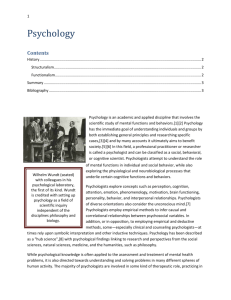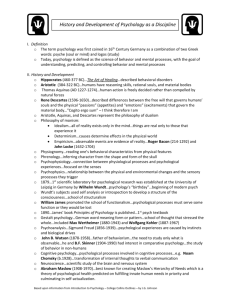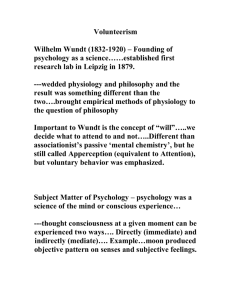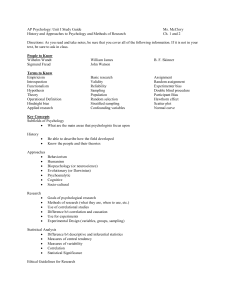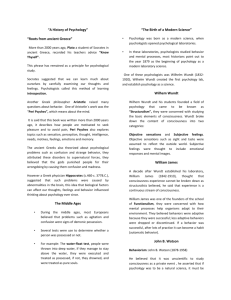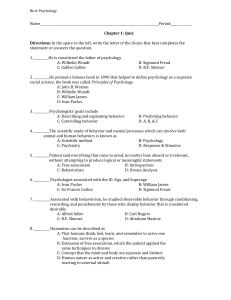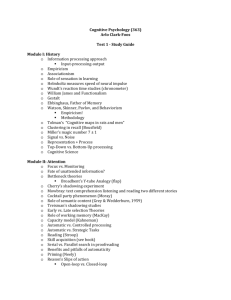Wundt's psychological experiment in the light of his philosophy of
advertisement
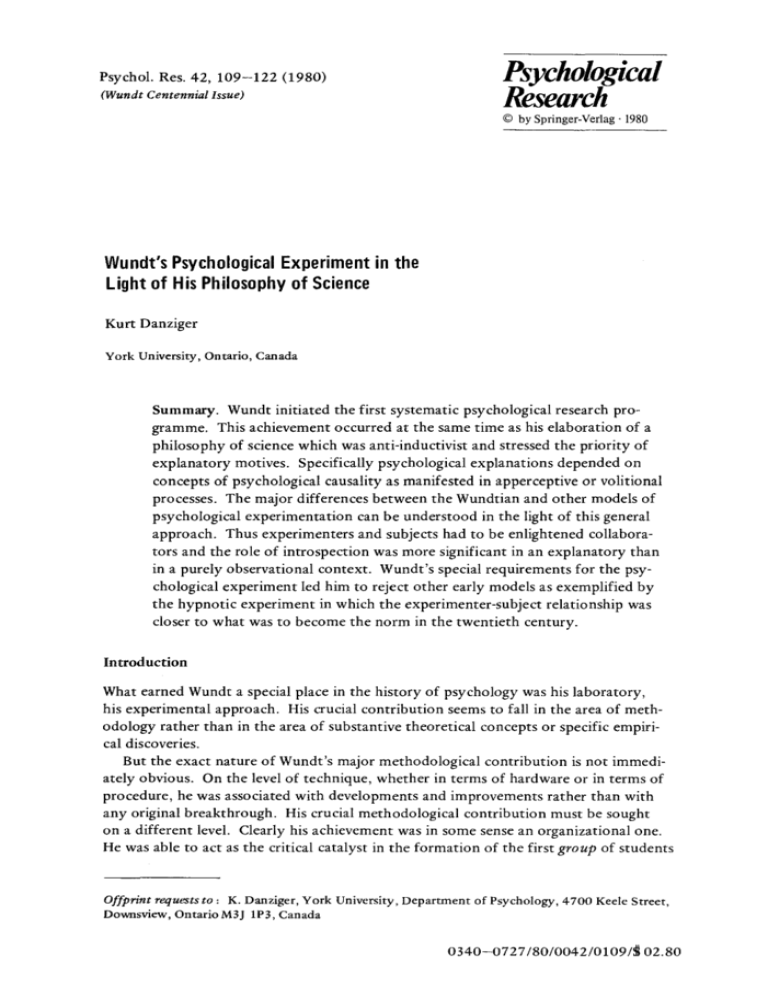
Psychol. Res. 42, 1 0 9 - 1 2 2 (1980) (Wundt Centennial Issue) Psychological Research © by Springer-Veflag• 1980 Wundt's Psychological Experiment in the Light of His Philosophy of Science Kurt Danziger York University, Ontario, Canada Summary. Wundt initiated the first systematic psychological research programme. This achievement occurred at the same time as his elaboration of a philosophy of science which was anti-inductivist and stressed the priority of explanatory motives. Specifically psychological explanations depended on concepts of psychological causality as manifested in apperceptive or volitional processes. The major differences between the Wundtian and other models of psychological experimentation can be understood in the light of this general approach. Thus experimenters and subjects had to be enlightened collaborators and the role of introspection was more significant in an explanatory than in a purely observational context. Wundt's special requirements for the psychological experiment led him to reject other early models as exemplified by the hypnotic experiment in which the experimenter-subject relationship was closer to what was to become the norm in the twentieth century. Introduction What earned Wundt a special place in the history of psychology was his laboratory, his experimental approach. His crucial contribution seems to fall in the area of methodology rather than in the area of substantive theoretical concepts or specific empirical discoveries. But the exact nature of Wundt's major methodological contribution is not immediately obvious. On the level of technique, whether in terms of hardware or in terms of procedure, he was associated with developments and improvements rather than with any original breakthrough. His crucial methodological contribution must be sought on a different level. Clearly his achievement was in some sense an organizational one. He was able to act as the critical catalyst in the formation of the first group of students Offprint requeststo : K. Danziger, York University, Department of Psychology, 4700 Keele Street, Downsview, OntarioM3J 1P3, Canada 0 340--07 27 /80/004 2/0109 /~ 02.80 110 K. Danziger engaged in the systematic application of experimental methods to the investigation of psychological problems. In other words, he was the initiator of the first scientific research programme in the history of psychology. There were other individuals who had carried out specific studies which would qualify as psychological experiments. But such isolated studies would never make a new science. For this, a sociological change and a change of orientation would be needed. Wundt provided the basis for both. At Leipzig in the 1880s there emerged the first research community that was held together by a commitment to the belief that psychological questions could be systematically answered by means of experimental methods. Wundt, of course, played the key role in this development. But what enabled him to do so? Clearly his personal administrative and teaching talents provided a necessary but hardly a sufficient ingredient. Wundt also contributed a highly elaborated and explicitly formulated set of concepts about scientific methodoiogy in general and the methodology of psychology in particular. His foundation of the first psychological laboratory was the very antithesis of haphazard experimental activism. Rather, it went hand in hand with extensive systematic thought about the possibilities and impossibilities of experimental psychology. It is as well to remember that the major theoretical contribution which precisely coincided with the foundation of the Leipzig research laboratory was Wundt's Logic (Wundt 1880, 1883)'rather than the Principles of Physiological Psychology (Wundt 1874) whose first edition had appeared some years previously. For an understanding of the significance of Wundt's practical contribution it is necessary to take both these works into account. Unfortunately, historians of psychology have often failed to appreciate that Wundt was a major contributor to the philosophy of science of his day and that his approach to psychological research only becomes meaningful in that context. This failure is involved in at least some of the misunderstandings that have accumulated around Wundt's work among later generations of psychologists. The Relevance of Wundt's Philosophy of Science Before turning to more specific questions of psychological methodology it is necessary to examine some aspects of Wundt's philosophy of science. The key to his approach is provided by his consistent opposition to the empiricist and inductivist philosophy of science which had been favoured by his mid-nineteenth century British predecessors like Herschel and J.S. Mill. For Wundt, all science involves the logical connection of contents of experience (Wundt 1903, p 677). But this logical connection is not simply a generalization from the data - it is a logical demand brought to the data: The basic ideal of mechanical physics is no more taken from experience, in any immediate and complete way, than are Aristotle's concepts of dynamics and energy. Rather, this basic idea originated as a logical demand and only received its justification through its fruitful application. Every scientific explanation of nature, according to the logical impulse of consciousness, strives for the unity and interconnection of phenomena...(Wundt 1907a, p 287) Thus in the development of concepts it is logical motives that confront the data [lit. experience] of natural science as speculative impulses in the sense that they do not simply await foundation in experience but initially provide the points of view from which this experience is assessed. (ibid., p 291) Psychological Experiment and Philosophy of Science 111 This approach to the philosophy of science is closely linked with Wundt's interpretation of the history of modern physical science, an interpretation that has an extraordinarily modern ring. He dismissed as a myth the idea that Bacon was the originator of the laws of scientific method and that induction was the logical instrument of scientific research (Wundt 1883, p 242). On the contrary, the origin of modern science did not involve any Baconian renunciation of speculation but was itself based on the speculative presuppositions of men like Galileo (ibid., p 243). What Galilean physics demanded was 'that the perceiver should regard sensory content as mere subjective appearance behind which was hidden the being of things which everywhere consisted only of geometric and mechanical relationships' (Wundt 1903, p 701 ; cf. Koyre' 1968). In other words, physical science as a whole developed in the same way as its parts still develop: its presuppositions must advance ahead of research if they are to be extended and corrected by research (ibid., p 700). Wundt's own psychological research programme was of course a striking illustration of this principle. Given Wundt's strongly anti-inductivist philosophy of science it comes as no surprise to find him increasingly defining his own position in opposition to the positivist philosophy of science. In the first edition of the Logik his remarks are directed against Comte, Spencer, and Kirchhoff, but by the time the third edition was published it was Mach's form of positivism that had become extremely influential (see Danziger, 1979a), and we now find more extended discussions of this position as well as the related views of Poincare'. Positivism, Wundt felt, had drawn the wrong conclusions from the history of science. The primary motivation in the evolution of modern science had not been the desire to establish empirical regularities for the purpose of prediction and control but rather the desire for theoretical understanding of the coherence of events. 'The basic motive of all scientific research is the postulate of the non-contradictory connection of facts' (Wundt 1903, p 723; see also Wundt 1866). Not only does positivism underestimate the fundamental role that purely theoretical presuppositions play in science, it also places far too great a value on the accumulation of isolated facts of observation (Wundt 1883, pp 285-286). It is Wundt's belief that science progresses not by the collection of relatively isolated observations but by establishing the coherence of facts (Wundt 1907a, p 303). His own programme of systematic psychological research represented an important practical expression of this belief. At a fundamental level Wundt contrasted his own belief in the principle of causality with positivist substitutes like the 'economy of thought.' What is at issue is the basis for unifying empirical observations. The positivism of Mach had sought this basis in the search for the most economical summary of observed regularities governed by practical concerns. For Wundt this was an inappropriate transfer of purely technological considerations to the realm of science (Wundt 1906, p 389). Such considerations might be useful if one was only interested in the superficial connection of appearances, but for Wundt scientific understanding involved much more than this. The transfer of the utility principle from the fields of economics and ~echnology to nature itself seemed to Wundt to entail a kind of subjectivism which would simply lead to the proliferation of arbitrary hypotheses (Wundt 1907a, pp 300-301). To the principle of economy of thought Wundt opposed the principle of causality. Science had to search for the causal connections among events. But causal connections were not equivalent to functional relationships, as Mach had proposed. There were functional 112 K. Danziger relationships which did not involve any causal connection and there were causal relationships which could not be expressed in the mathematical form of functions (Wundt 1906, p 599). By reducing the study of causal relationships to the study of functions, positivism had barred the way to a consideration of those essentially qualitative forms of causal connection which became particularly important in what Wundt called psycbic causality (on this concept see Petersen 1925). Wundt was remarkably clear about the fact that the existence of the field of psychology was a direct consequence of the creation of the science of mechanics by Galileo and other pioneers of modern physics. Galileo's distinction between primary and secondary qualities and his restriction of the subject matter of physics to matter in motion left the rest of experience to be accounted for in other terms. Wundt in fact defended the thesis that 'the independence of psychology [was] a postulate of the mechanical theory of nature'; a position which has a curiously modern ring (see, e.g., Mackenzie and Mackenzie 1974). As movement in space turned out to be the only content of objective experience given without contradiction, modern physics did not raise at all the question of the nature and of the relationships between the subjective elements of perception. Thus these latter were automatically assigned to a separate science that was specifically different from physics though at the same time it supplemented physics in the investigation of the total content of experience - this science was psychology. (Wundt 1903, p 703) A science, for Wundt, was never simply a collection or a summary of observations it always involved the search for explanation. Therefore, the division of the world of experience into one part appropriated b y physical science and another part which formed the field of psychology entailed a division in types of explanation; If the science of physics had developed its own forms of mechanical explanation for the phenomena to which it restricted itself, then any science of psychology worthy of the name must seek its own specifically psychological forms of explanation. Wundt expressed this in terms of the distinction between physical causality and psychic causality because for him scientific explanation meant reference to the principle of causality (see also Mischel 1970). Over the years the specific content which Wundt assigned to the concept of psychic causality underwent a number of changes and was never free of ambiguity (see, e.g., Wundt 1894a, 1897, 1903, 1908). But he remained consistent on certain fundamental precepts. As early as 1880 he was certain that there was a distinctly psychological form of causality which manifested itself in acts of thought and in emotional and volitional activity (Wundt 1880, pp 5 6 3 - 5 6 4 ) . It was the task of psychological explanation to find a middle course between psychophysical reductionism which recognized only physical causality and the kind of philosophy which ignored the physical contingencies under which the mind operated. This middle course was to be provided by a system of psychological determinants regarded purely as process or activity without reference to any metaphysical notion of substance, whether physical or spiritual. While this sketchy account can hardly claim to do justice to Wundt's elaborate discussion of the philosophy of science, it will serve to illustrate an important aspect of his pioneering deed in establishing the first psychological laboratory. It is an aspect that has too often been overlooked b y historians of psychology who have generally Psychological Experiment and Philosophy of Science 113 adopted a perspective very different from Wundt's own. If the question of the original establishment of psychological laboratories is reduced to a purely technical question of coUecting together a few bits and pieces of apparatus and continuing work on specific problems already opened up by physiologists, then there is indeed little to distinguish the contribution of Wundt and that of others who followed closely behind. What gives a special character to his activities in this direction is not simply their timing and their extent but rather the scientific vision that motivated them. That vision is intimately bound up with Wundt's work in the philosophy of science. It was the systematic, programmatic nature of his contribution to experimental psychology that transformed that field from a collection of separate empirical studies into something that could begin to call itself a discipline. But these features of his contribution can only be understood in the light of a highly articulated philosophy of science which stressed logical coherence as the primary aim of scientific activity. This is not intended to dismiss the importance of Wundt's physiological background and his appreciation of technical problems. However, there were others who were equally at home in this area. Wundt's special historical position arises from the wider perspectives he was able to bring to bear on the more specific problems of psychological research. What Constitutes a Psychological Experiment As one might expect, Wundt's general approach to the problems of scientific methodology is reflected in the specific form he gave to the psychological experiment. Because that form was to a large extent abandoned by later generations of psychologists, it has often been misunderstood. While a high proportion of psychologists have agreed with Wundt that psychology should make use of experiments, they have often disagreed with him and with each other about what constituted a psychological experiment. The pioneers of French psychology, the members of the Wiirzburg School, pure introspectionists like Titchener, the early behaviourists, all had rather different models of psychological experimentation and none of these really conformed to Wundt's model. Unfortunately, the history of the psychological experiment remains one of the most important unwritten chapters in the history of psychology. Let us therefore make a modest beginning by a brief examination of some special features of Wundt's contribution in this area. It is clear that his general anti-inductivism would lead Wundt to be sceptical of the value of purely descriptive observational methods. In his first paper on 'The tasks of experimental psychology.' published in 1882 when his laboratory was just getting underway, he expresses this scepticism: 'The most accurate description of a field of phenomena leaves their coherence obscure as long as it does not lead to an explanatory hypothesis from which the individual facts can be derived' (Wundt 1906, p 206). Because for Wundt the explanation of the coherence of phenomena was the basic and essential task of all science, descriptive observation had to give way to experiment. By varying the conditions under which phenomena appear the experimental method is able 'to proceed to the question of the why of phenomena.' This is the primary rationale for the experimental method in general which Wundt gives in the 'Metbodenlebre' of 1883. There he sums up his argument in the following characteristic 114 K. Danziger statement: 'In truth, the causal point of view did not arise out of experimental procedures, but on the contrary it necessarily led to that deliberate isolation and variation of conditions which constitute the essence of experiment' (Wundt 1883, p 278). We might note in passing that Wundt does not speak of 'prediction and control' in this context. That consideration was introduced by others. His goal was the explanation of 'the why of phenomena,' and he saw the systematic control of experimental conditions as a necessary means for the achievement of that goal. It is only when research becomes entirely subordinated to practical motives that prediction and control assume the status of primary goals in themselves. For Wundt, however, the need for experiment arises out of the demand for causal explanations. In the field of psychology this becomes more specifically a demand for explanations in terms of psychological causality. Wundt saw very clearly that an experiment was essentially a way of asking theoretical questions. Therefore, distinctions between one kind of experiment and another were primarily based on differences in, the theoretical questions they were designed to answer and not on technical differences in procedure. At the outset of his earliest systematic exposition of the matter Wundt makes a clear distinction between physiological experiments which are primarily designed to answer physiological questions and psychological experiments designed to answer psychological questions. The need for the latter arises because purely physiological knowledge can at best stimulate or at worst confuse the actual task of psychological analysis (Wundt 1883, p 483). The essential difference between the reaction time experiments performed in Wundt's laboratory, for example, and those previously performed by physiologists is not founded on basic differences in technique but arises out of the different theoretical context in which these experiments are placed. Wundt's original contribution involved taking already developed techniques out of their original context and providing them with a new, specifically psychological, context. The same thing applied to Wundt's use of the psychophysical methods that had been developed by Fechner. Wundt did not believe in the concept of psychophysical causality, nor did he believe that simple sensations were to be found in immediate experience. What he stressed was the fact that psychophysics led one to ask specifically psychological questions that demanded a psychological answer: Thus there arises the demand that sensation should be incorporated into a purely psychological causal connection ... So psychophysics, even at the threshold of its investigations, arrives at the presupposition that a deeper understanding of individual mental life can be achieved only through the assumption of its coherence with a more general mental life, a presupposition which it passes on to psychology. (Wundt 1883, p 485) Where others had seen mainly a physiological or a psychophysical causal nexus Wundt saw it as his primary task to raise the question of the specifically psychological coherence of phenomena. His psychological methods cannot be understood in separation from his psychological theories. This raises the question of what, to Wundt, constituted the specifically psychological features of a psychological experiment. What exactly was it that transformed an investigation in sensory physiology or in psychophysics into a psychological study? Psychological Experiment and Philosophy of Science 115 In the English language literature there has developed a traditional answer to this question in terms of Wundt's use of the method of introspection. The supposition is that the difference between the physiological and the psychological experiment lay in the data base, in the kinds of observations that were made, objective in the one case and introspective in the other. However, this is a fundamental misinterpretation of Wundt's meaning from the point of view of an empiricist philosophy which he did not share. It is the position adopted by Titchener in America, but it is not Wundt's position (Danziger 1980a). There is no more convincing way to ascertain the role played by the data of introspection in Wundt's laboratory than to go through the experimental reports published in the twenty volumes of the Pbilosopbische Studien. One then finds that in the overwhelming majority of these reports the data base that forms the experimental results consists of objective measurements and in no way involves systematic qualitative introspection. Two kinds of objective measurement predominate, time measurements and simple quantitative judgments of features o f experimentally presented physical stimuli. Introspective reports of mental processes such as were to be found in the later work of the Wiirzburg School and in American 'introspective psychology' virtually never feature in the reports of experimental results from Wundt's laboratory. Introspective references in these reports are generally limited to the following contexts: a) Attempts to explain individual differences in the objective data, which was of course a matter of no systematic interest in Wundt's laboratory; b) checks on the effectiveness of experimental manipulations, e.g., in regard to levels of attention. It is a mistake to attribute to Wundt the kind of 'systematic introspectionism' which enjoyed a brief vogue in the history of experimental psychology during the early years of the twentieth century (Danziger 1980b). Wundt himself denounced this later misuse of introspection in no uncertain terms (Wundt 1907b). If the difference between physiological or psychophysical experiments and genuinely psychological experiments cannot be reduced to a question of the nature of the data base, one must look for the answer in another direction. Wundt's general philosophy of science immediately indicates this direction. We have seen that for Wundt it is theory that produces the questions which then lead to a search for data and not the data that inductively generate theory. It follows that the basis of the differences among sciences is to be primarily looked for in the different theoretical or explanatory contexts within which they operate. Basically, what makes an experiment a psychological experiment is the fact that it is designed to answer psychological questions. The reason why Wundt was able to initiate a programme of psychological experimentation was that he had some theories about psychology that were capable of leading to experimentally formulated questions. The interrelationship between his practical and his theoretical achievements was an extremely intimate one. In Wundt's own view, what made his theories specifically psychological in character, and not physiological or psychophysical, was their invocation of a psychological form of causality. In other words, the explanations he was seeking were to be in terms of the effects of psychological processes on each other. Moreover, psychological processes, to Wundt, were always mental processes. Thus, the purpose of Wundt's psychological experimentation was to test explanations of how mental processes interacted. 116 K. Danziger It is impossible to understand the characteristic nature of the Wundtian experiment unless one follows his distinction between the goals of psychological experimentation and the means used to achieve those goals. The goal is certainly mentalistic explanation, but the means used to produce systematic variation in mental processes have a physical basis. This may take the form either of a variation of physical stimulus conditions or of objectivemeasurements of response, especially time measurements, under known psychological conditions. Wundt's position is that causal explanations can be tested only when systematic variation of conditions and precise observation are possible. That is why one must perform experiments. But both the systematic variation of conditions and the making of precise observations require the intervention of physical means. Psychic causality cannot be effectively studied by observing mental processes for themselves. But the use of objective anchors in the experimental study of mental processes does not imply an abandonment of the goal of demonstrating the operation of psychic causality, on the contrary, it is required by that goal. The Wundtian Experiment and Some o f Its Rivals The generation of experimental psychologists that followed Wundt did not, in general, share his belief in the importance or even in the existence of psychic causality (Danziger 1979a). Their interest in mental processes became a purely descriptive or at least a phenomenological one. Therefore, they began to use introspection in a systematic way as a primary source of data. The qualitative introspective study of mental processes now became the ultimate goal of psychology. This was not true of Wundt whose own qualitative introspective references were rather in the nature of illustrations to render his accounts of mental determinants intelligible (e.g., Wundt 1894b). For the systematic testing of his hypotheses about mental determinants, however, he had recourse to more precise methods. To use a somewhat anachronistic m o d e m terminology one might say that Wundt tended to draw on qualitative introspective material in the context of discovery and to rely on relatively objective methods in the context of verification. For instance, his tri-dimensional theory of feeling is introduced with the use of introspective iUustrations but he attempted to verify it by means of objective measurements of affective response (Wundt 1897; 1900). One may wonder whether his general approach in this respect was really so very different from that of some more modern psychologists, except that the latter have become shy about revealing the introspective context that germinated some of their hypotheses. Wc have seen that for Wundt the ultimate goal of the psychological experiment lay in the unravelling of a specifically psychological form of causality, not in the mere collection of introspective observations or in the establishment of the dependence of psychological processes on physical conditions. To understand the methodological implications of this position it is necessary to inquire a little further into this notion of psychological causality. From the early days of his laboratory Wundt saw the manifestation of psychological causality primarily in terms of the apperceptive process. This was the active mental process that operated on the material supplied by the senses and transformed it into the mental constructions which constitute the content of the mind. While a purely psychophysical point of view would limit itself to Psychological Experiment and Philosophy of Science 117 investigating the physical conditions that were necessary for the appearance of given sensory material, the truly psychological point of view would investigate the laws that governed the apperceptive transformation of this material into mental complexes. This was not to deny that apperceptive processes also had a physiological basis. But their causal effect on the mental level could never be deduced from this basis and required a specifically psychological analysis. From an early stage Wundt identified apperception and will (Wundt 1883, p 511). By this he certainly did not mean that apperception was 'free' in some metaphysical sense; on the contrary, the laws of its operation were precisely what psychological research was supposed to investigate. What he did mean was that apperception was an expression of the self-determination of the subject: the fact that the subject did not simply react passively to stimuli but more or less deliberately imposed its own construction on the sensory stimuli to which it was exposed. Furthermore, the identification of apperception and will expressed Wundt's fundamental belief that the processes of apperception were not purely intellectual in character but were intimately related to the affective aspects of mental functioning. It was this belief that more than anything else distinguished Wundt's mature psychological theory from his early attempts in that direction. The identification of apperception and will has profound importance for an understanding of Wundt's standpoint. It was this identification that was soon to lead him to characterize his whole psychological position as 'voluntarism.' His emphasis was on the existence of subjective determinants which imposed their law on the structure of experience and behaviour. It was these determinants that an empirical, including, of course, an experimental, psychology ultimately had to illuminate. There was a clear duality in Wundt's approach to the question of the causes or determinants of experience and behaviour. On the one hand, there was the dependence of subjective responses on imposed, essentially physical, conditions. In this respect the subject reacted passively and psychological causality in Wundt's sense was not involved. One could study this level of passive responding, for example, in investigating psychophysical and psychophysiological relationships. Such processes as association by contiguity were also classified by Wundt as belonging to this category of passive response. On the other hand, there was the level on which the subject really acted as a subject and not merely an object of influence. On this level active apperception predominated and determined the combination and flow of mental events. This was the level on which psychological causality operated, and it was this that the true psychological experiment ultimately attempted to study. It is necessary to keep this theoretical background in mind if one wishes to understand one fundamental feature that distinguishes the Wundtian experiment from other types of psychological experimentation that were later to displace it almost completely. In his programmatic paper on 'The tasks of experimental psychology' (Wundt 1882) Wundt lays down the precept that a 'comprehending acceptance of the intentions of the psychologist' was a precondition for the effective conduct of psychological experiments. Hence these experiments were to be mainly limited to investigating 'the consciousness of the mature person'; it was unlikely that they would prove useful in studying psychological development or psychological disturbance. There is more involved here than the unreliability of introspective reports from children and 118 K. Danziger disturbed individuals. It is not only a question of the observational base but also one of the causal context. If the ultimate goal of the psychological experiment is the investigation of psychological causality, and if psychological causality operates preeminently when the individual is not merely reacting to non-psychological conditions but is actively determining the nature of his psychological response, then it follows that the psychological experiment must study the individual in the latter rather than in the former type of situation. This latter type of situation exists when the experimental subject is in a position to adopt voluntarily and intelligently that attitude of 'comprehending acceptance of the intentions of the psychologist' of which Wundt speaks; it does not exist when the subject is treated merely as a passive responder to externally imposed conditions. Some crucial features which distinguish the Wundtian experiment from later types of psychological experiment become intelligible in the light of these considerations. The experiments that Wundt initiated did not, and in view of their ultimate purpose, could not involve 'naive' subjects who are ignorant of the real purpose of the experiment and are expected to carry out experimental instructions blindly. Commonly, Wundt and his students experimented on each other. Wundt would often suggest the research topic to a student who would then elaborate the details and include Wundt himself among the experimental subjects. (In the earlier volumes of the Pbilosopbiscbe Studien Wundt's appearance in the role of experimental subject is as ubiquitous as his appearance in the role of theorist.) Not infrequently, Wundt's students would act as subjects in each other's experiments. On other occasions an investigator would alternately take the role of experimenter and subject in his own experiment, relying on a colleague to act in the reciprocal role when necessary. Now Wundt was anything but naive about the dangers of intellectual preconceptions biasing observation. In fact, he frequently warned against these dangers and they formed an important element in his cautious attitude to introspection and his preference for relatively objective methods and unambiguous introspective judgments "" e.g., Wundt 1888b, 1892, 1900a). But it did not occur to Wundt that the use of 'naive' subjects would be an appropriate way of dealing with these problems. He was much more inclined to set limits to the applicability of the experimental method as such than to accept versions of it that, from his point of view, would destroy its purpose. That purpose ultimately involved the question of psychological causality in his sense. In order to investigate this type of causality the subject's volitional processes had to be placed in the service of the experiment in an active and intelligent manner. For instance, the direction and level of attention often had to be varied in a manner appropriate to the purpose of the experiment. But this required the cooperation of an enlightened subject. The Wundtian experiment did not involve the manipulation of a 'blind' subject; it was a collaborative enterprise on the part of a group of investigators who took turns in playing the roles required by this enterprise. In fact, Wundt was quite explicit about the fact that the division of labour between experimenter and subject was not a necessary feature of the experimental method in psychology as he understood it (Wundt 1907b). It is sometimes forgotten that in the early days of experimental psychology there was another model of psychological experimentation which aroused considerable interest and which was critically different from the Wundtian model in this crucial Psychological Experiment and Philosophy of Science 119 respect. This was the hypnotic experiment. In the 1880s and 1890s experiments involving hypnotized subjects enjoyed quite a vogue and were practised in a number of countries (see, e.g., Hall 1883 ; Beaunis 1885 ; Binet and Frr6 1886). The social psychology of these experiments provided a complete contrast to that of the Wundtian experiment. Here there was indeed a profound and essential difference in the power and in the level of awareness of the experimenter and of the subject. There was an inherent role polarity in this situation which was very different from the Wundtian experiment. In this rather fundamental respect the hypnotic experiment was much closer to the majority of contemporary psychological experiments than was the Wundtian model. Needless to say, Wundt saw little value in these experiments. His paper on hypnotism contains a rather neglected but most illuminating section on 'suggestion as an experimental m e t h o d ' (Wundt 1893). The major problem that Wundt sees here concerns the virtual impossibility of discovering in any precise way just what the psychological effects of the experimenter's influence are. It is clear enough that some kind of effect is being produced, but the subject is in no condition to report on these effects in any accurate and reliable way. One can observe the stereotyped patterns of the hypnotic trance b u t this in itself provides no precise information about the subject's mental processes. Without this information the experimenter remains in the dark about what exactly is happening in this situation in a psychological sense. Therefore, Wundt felt, this method was unsuitable for investigating the fundamental laws according to which mental processes operated. For this it would always be necessary to rely on experimental situations in which the subject was in the position of a collaborator able to give a precise account of himself. One can see here how Wundt's twin requirements for the psychological experiment assert themselves: The requirement for truly psychological content and the requirement for precision. If our discussion has concentrated on the former this is only because the latter has generally been more clearly understood, not because it is unimportant. In fact, in his discussion of the method of suggestion Wundt mentions that the external conditions of an experiment 'possess psychological value only insofar as they force introspection to give an answer to a precisely put question' (Wundt 1893, p 65). However, precision without psychological meaning is useless. 'Numbers can be auxiliary means for discovering the taws of events and for the application of certain laws. But in the last analysis they are never an end in itself for an explanatory science' (Wundt 1893, p 65). It was true that a causal analysis required the study of the relationship between specific known variations of conditions and precisely observed effects. But unless this relationship could be interpreted as a psychological one, in Wundt's sense, the study would still have failed as a fundamental psychological experiment, because it could shed no light on the operation of psychological causality. Wundt therefore made a distinction between two kinds of experiment. It is a distinction that first occurs in the context of his discussion of the method of suggestion and is repeated several years later in his better known critique of the experimental methods of the Wiirzbutg School (Wundt 1907b). The experiment in the wider or imperfect sense simply involves the production of effects by means of some deliberate manipulation, the appearance of the effects being contingent on the manipulation. 120 K. Danziger But in the narrower sense there are more perfect experiments where a precise control and variation of conditions and an accurate establishment of psychological effects makes possible a systematic analysis of underlying causal relationships in a manner analogous to fundamental experiments in physical science. The looser type of experiment might still be used to establish general empirical correlations without any understanding of the underlying processes. This procedure might have a place in the area of applied psychology, Wundt thought. But it was useless for the development of the kind of systematic explanatory science that constituted Wundt's vision for psychology. Basically, the loose experiment might fail to meet Wundt's perfectionistic criteria because it did not ask precise questions, because it could not elicit precise answers, or because the questions and the answers where not really psychological in character. Only a narrow range of experiments met the very stringent criteria that Wundt had set up for the rigorous psychological experiment. He was always very explicit about the fact that such experiments could only be used to investigate psychological processes on a relatively simple level and mostly in terms of their cognitive rather than their affective components (for early statements on this see Wundt 1863, 1882, 1883). But the answer to this dilemma he sought, not in a modification of his strict criteria for the experimental method, but in a switch to the comparative and developmental-historical methods that he employed in his extensive studies of the psychology of language, myth, art, religion, and so on (Wundt 1888a, 1900b). He deafly considered these comparative social psychological methods to have far greater scientific value than what he regarded as the rather shoddy travesty of experimentation practised by many of his psychological contemporaries and successors. We know that most psychologists turned a deaf ear to Wundt. Three major factors were at work here. In the first place, many influential psychologists of the younger generation were swept up by the wave of positivism which strongly affected fundamental thinking in the physical sciences around the turn of the century. From this point of view Wundt's notion of psychological causality was clearly just a piece of unnecessary metaphysical baggage which had to be dropped if true science was to prevail (Danziger 1979a). Consequently, Wundt's insistence that only a circumscribed type of psychological experiment was capable of providing causal insights no longer made much sense, and the way was clear for the proliferation of vaguely experimental methods, many of which were simply 'pseudo-experiments' from Wundt's point of view. The second factor in the transformation of psychological methodology involved the development of a very strong interest in the possible practical uses of psychology to the point where psychological technology became equated with psychological science (Danziger 1979b). From this perspective Wundt's special methodology geared to the goal of a pure explanatory system made even less sense. Finally, the historical demise of Wundt's dual methodological solution was sealed by the overwhelming influence of a radically individualist approach to psychology for which even social psychology was the psychology of individuals and for which Wundt's group psychological and historical approach and methodology were simply incomprehensible (Danziger 1980c). Under the weight of all these influences Wundt's original vision for the science and the method of psychology was rather quickly and unceremoniously buried. Its Psychological Experiment and Philosophy of Science 121 tombstone in later historical texts took the form of a few strange inscriptions which bore little resemblance to the living form of the original. From the vantage-point of our own times the limitations of Wundt's approach are not difficult to discern. But in the meantime we have also learned to appreciate the grave limitations and dubious biases of those who buried him. This suggests that there may be something to be gained by a more sympathetic and constructive attempt at understanding Wundt's decisive historical action in launching the first systematic programme of genuinely psychological experimental research. At the very least it is clear that he had a degree of sophistication in the fundamental questions of scientific method that was not matched by his psychological successors. The questions he raised about the interrelationship between psychological theory and psychological method and about the appropriate requirements for experimentation in psychology are not by any means closed questions. If a consideration of Wundt's solutions causes us to take a fresh look at our own often implicit assumptions on these issues we may come to regard his ideas and practice as of more than 'mere' historical interest. References Beaunis HE (1885) L'experimentation en psychologic par le somnambulisme provoqu£ Rev Phil 2 0 : 1 - 3 6 , 1 1 3 - 1 3 5 Binet A, F~r6 C (1901) The psychology of reasoning: Based on experimental researches in hypnotism. London: Kegan Paul (French original 1886) Danziger K (1979a) The positivist repudiation of Wundt. J Hist Behav Sci 15: 205-230 Danziger K (1979b) The social origins of modern psychology. In: Buss AR (ed) Psychology in social context. New York: Irvington Danziger K (1980a) Wundt and the two traditions of psychology. In: Rieber RW (ed) Wilhelm Wundt and the making of a scientific psychology. New York: Plenum Press Danziger K (1980b, in press) The history of introspection reconsidered. J Hist Behav Sci 16 Danziger K (1980c) On the threshold of the new psychology: Situating Wundt and James. In: Bringmann WG, Tweney RD (eds) Wundt studies. G6ttingen and Toronto: CJ Hogrefe Hall GS (1883) Reaction-time and attention in the hypnotic state. Mind 8:170-182 Koyr6 A (1968) Metaphysics and measurement: Essays in scientific revolution. London: Chapman and Hall Mackenzie BD, Mackenzie SL (1974) The case for a revised systematic approach to the history of psychology. J Hist Behav Sci 1 0 : 3 2 4 - 3 4 7 Mischel T (1970) Wundt and the conceptual foundations of psychology. Philos Phenomenol Res 31:1--26 Petersen P (1925) Wilhelm Wundt und seine Zeit. Stuttgart: Frommann Wundt W (1863) Vorlesungen fiber die Menschen- und Thierseele. Leipzig: Voss Wundt W (1866) Die physikalischen Axiome und ihre Beziehung zum Causalprincip. Erlangen: Enke I22 K. Danziger Wundt W (1874) Grundzfige der physiologischen Psychologie. Leipzig: Engelmann Wundt W (1880) Logik: Eine Untersuchung der Principien der Erkenntniss. 1. Band: Erkenntnislehre. Stuttgart: Enke Wundt W (1882) Die Aufgaben der experimentellen Psychologie. Unsere Zeit, 1882. • (Reprinted in Wundt W (1906) Essays, 2nd edn. Leipzig: Engelmann) Wundt W (1883) Logik: Eine Untersuchung der Principien der Erkenntnis. 2. Band: Methodenlehre. Stuttgart: Enke Wundt W (1888a) Uber Ziele und Wege der V61kerpsychologie. Philos Stud 4 : 1 - 2 7 Wundt W (1888b) Selbstbeobachtung und innere Wahrnehmung. Philos Stud 4: 292-309 Wundt W (1892) Zur Frage des Bewusstseinsumfangs. Philos Stud 7:222-231 Wundt W (1893) Hypnotismus und Suggestion. Philos Stud 8:1-85 Wundt W (1894a) f.~lberpsychische Kausalit/it und das Princip des psychophysischen Parallelismus. Philos Stud 10:1-124 Wundt (1894b) Zur Beurteilung der zusammengesetzten Reactionen. Philos Stud 10:485-498 Wundt W (1897) Outlines of psychology. Leipzig: Engelmann Wundt W (1900a) Bemerkungen zur Theorie der Geffihle. Philos Stud 15:149-182 Wundt W (1900b) V61kerpsychologie. 1. Band. Leipzig: Engelmann Wundt W (1903) Grundzfige der physiologischen Psychologie. 3. Band, 5th edn. Leipzig: Engelmann WundtW (1906) Logik. 1. Band, 3rd edn. Stuttgart: Enke WundtW (1907a) Logik. 2. Band, 3rd edn. Stuttgart: Enke Wundt W (1907b) Ober Ausfrageexperimente und fiber die Methoden zur Psychologie des Denkens. Psychol Stud 3:301-360 WundtW (1908) Logik. 3. Band, 3rd edn. Stuttgart: Enke
